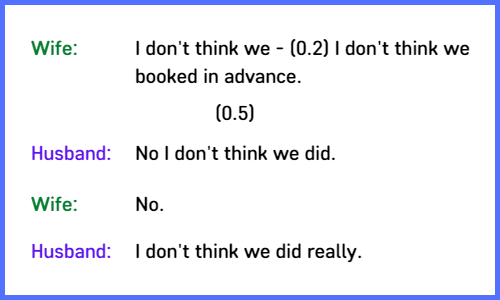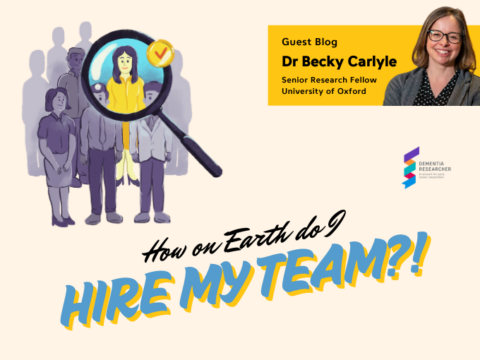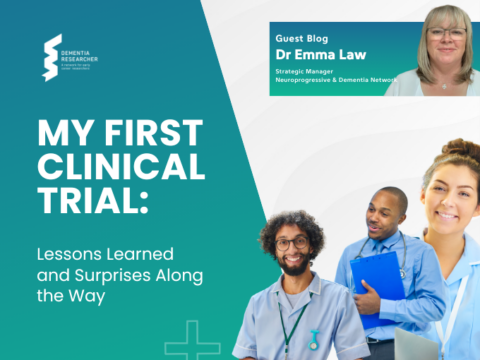I have recently come across a body of literature by another PGR called Elin Nilsson at Linköping University in Sweden and it really fascinated me. Elin’s research is all about the couple relationship, where one spouse is living with dementia and the other is not. Elin also uses conversation analysis in her work. Elin’s work has looked at pronoun use (when and how people use ‘we’) and how this can function to maintain or (re-)construct the couple relationship. This research combined conversation analysis with quantitative analysis of the pronoun use – looking at use of ‘I’ and, more intently looking at instances of ‘we’ by categorising them into different types of ‘we’ – for example when the ‘we’ refers to just the couple, or when it refers to a group such as ‘we’ as a family, as colleagues, or as an ethnic group. There is more nuance to it than this and I would really recommend reading Elin’s paper if you would like to read more on the matter.
The interest in ‘we’ in particular comes from research which has shown frequent use of ‘we’ to be associated with lower levels of caregiver stress, although there has been little research of this kind specifically with couples where one has dementia. As dementia poses challenges to a couple relationship, one way in which this can be mediated is through language choice that speakers make; how the couple interacts with one another. This may allow for the formation of different types of relationship or maintain existing ones. Older couples especially who have shared most of their lives together may have more of a couple identity and draw on more shared memories. This was termed ‘couplehood’ by Kaplan (2001) and refers to how couples put much time and effort into maintaining their relationship and involving the spouse living with dementia in interactions. This kind of research is different to the norm in that it looks at how the couple relationship impacts their ability to navigate dementia and not how dementia impacts the couple relationship. It is the aim of Elin’s research to focus on couplehood and we-ness as an approach “to understand dementia less in terms of how the changes of the individual with dementia affects the healthy spouse and more in terms of how the spouses jointly understand themselves as a couple and in what ways this can facilitate a couple’s relationship and their shared life”.
I found Elin’s research both interesting and relevant to mine. As I have begun my conversation analytic exploration of my data set, I have started with data which involves two people – where some are romantic couples and one pair are friends. I have been looking at co-remembering where the pairs are recalling things from the past together. I have found this to be intriguing but have also noted the use of pronouns. For example, in one video where a married heterosexual couple are interacting there is use of different pronouns. For context, in this interaction, a lady diagnosed with probable Alzheimer’s disease and her husband, are at their daughter’s house. They have been discussing the Chelsea Flower Show and whether they had to buy tickets in advance when they went to it previously. Please see the transcript below:

This short transcript shows both the Husband and Wife using the pronouns ‘I’ and ‘we’. It is interesting how this could have been said differently – June could have said “We didn’t book in advance” or “I didn’t book in advance” but instead there is use of both of the pronouns. In terms of managing their couplehood (that they are two individuals – two ‘I’s that make up one couple – a ‘we’) both Graham and June’s talk can be seen to represent them as separate individuals – with their own knowledge and recollections: “I don’t think”, and as a couple: “we booked in advance”, “we did” or “we did really”. This could be indicative of their couple identity – that there is dependence on one another but independence of knowledge and experiences also. This is only a very small example, so it is not possible to draw any conclusions as yet.
This is something I am excited to investigate further as I continue with my analysis of the data set in which pairs of people are interacting. I am so glad to have come across Elin’s work in my readings and it has provided me with fresh ideas for analysing my own data.

Felicity Slocombe
Author
Felicity Slocombe is a first year PhD Student from Loughborough University. Felicity’s research focuses on identity and dementia and how identity can be managed interactionally – how we can help support identity of people living with dementia through our conversations. Driven by a family connection to dementia, and writing each month on a range of topics from her work, and that of her wider group ACTInG (Applied Cognition Technology and Interaction Group), and sharing news from her training and events.

 Print This Post
Print This Post





